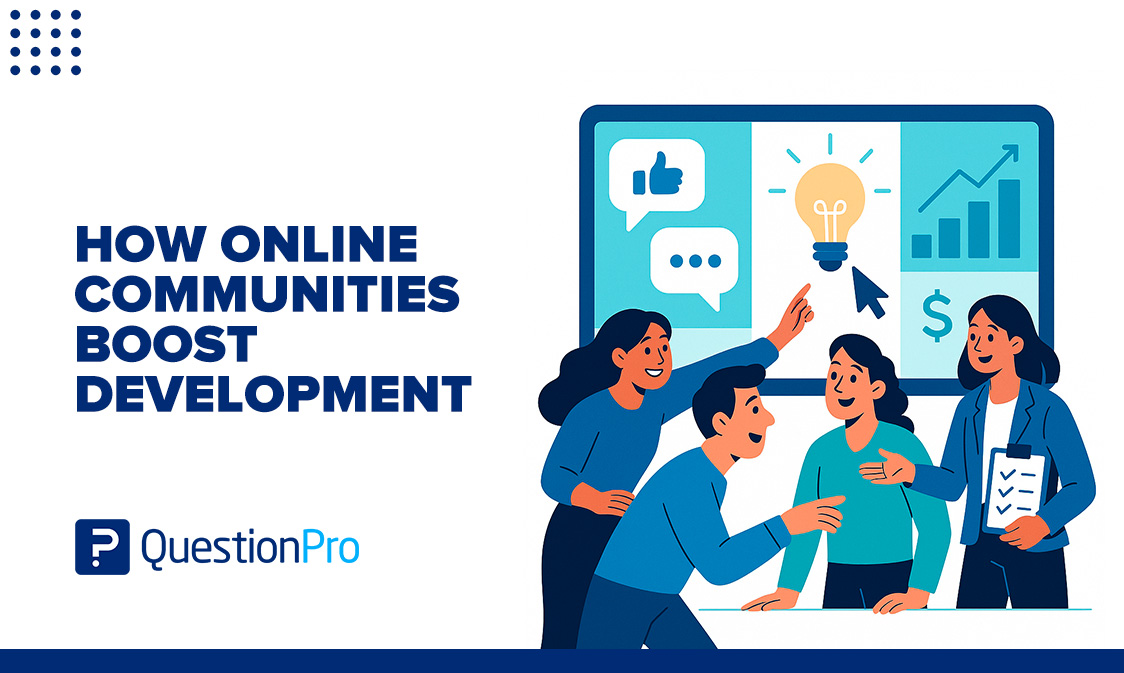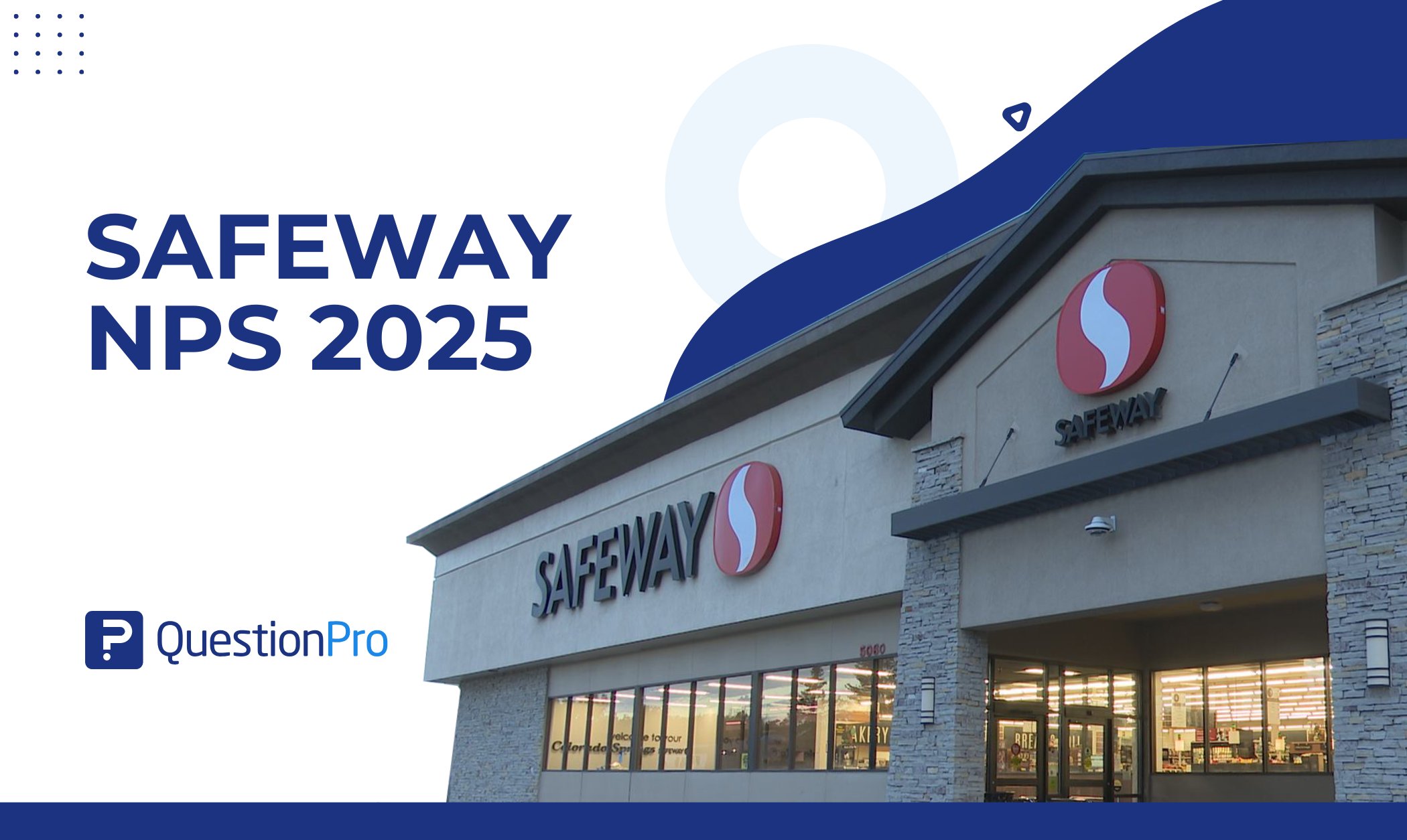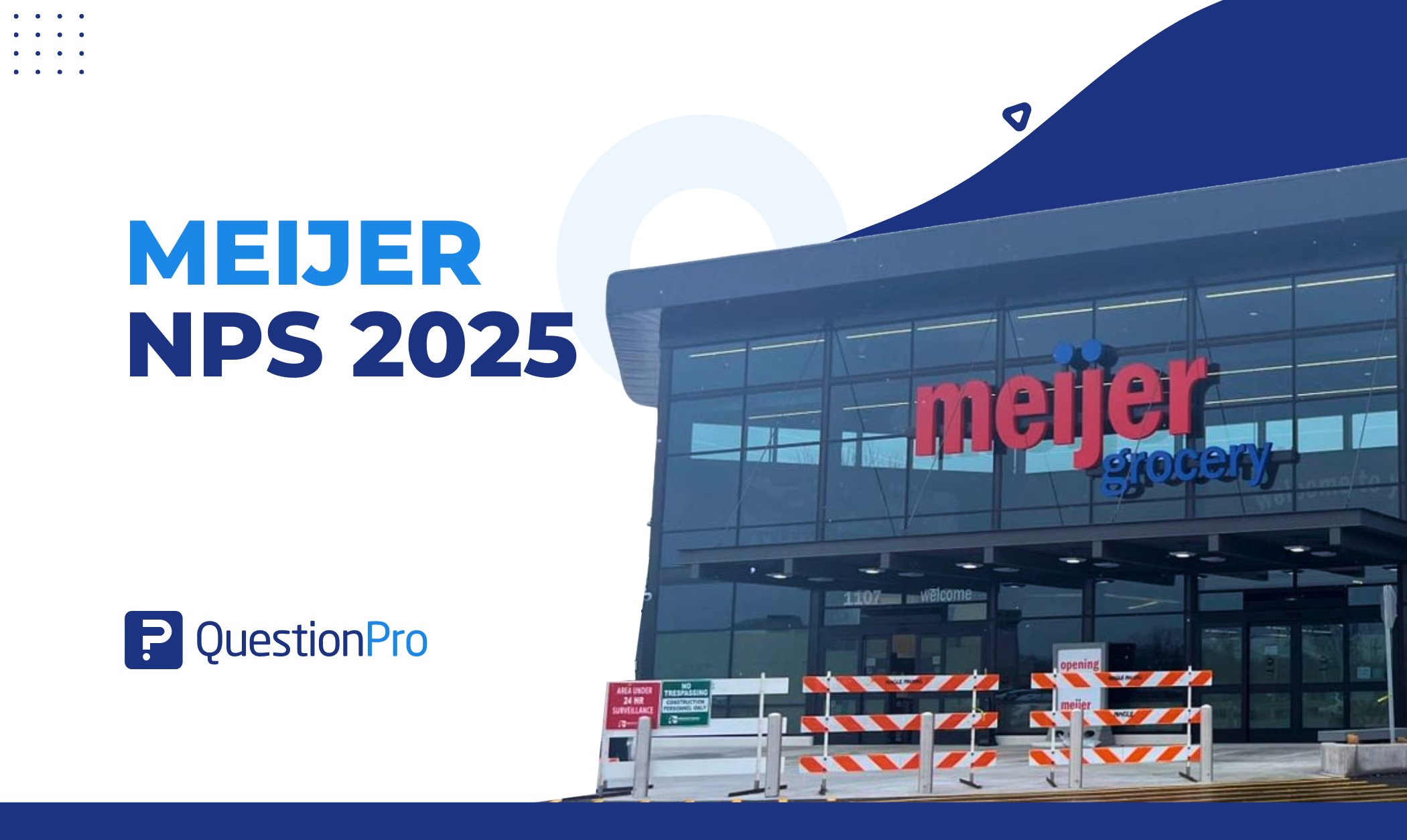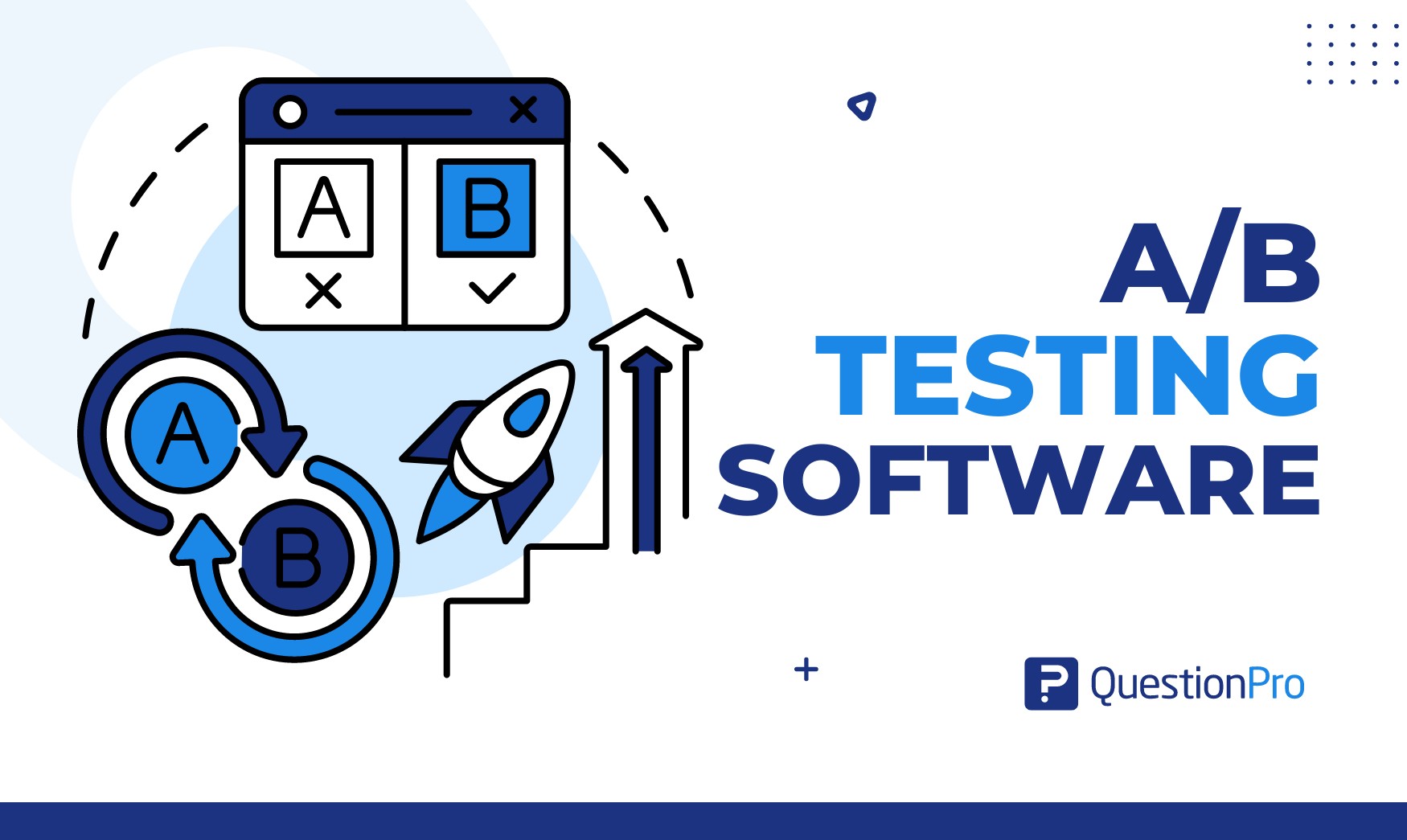
A/B testing is now a common practice, so the real challenge is picking the right A/B testing software. With Google Optimize shutting down in September 2023, many people who use A/B testing will need to find a new solution. This change will affect those working in conversion optimization, whether in-house, at an agency, or as consultants.
Instead of hiring someone to compare all the options, you can use the insights from others who have already done this work. To help you out, we’ve put together a list of top A/B testing tools and included reviews from experts to make your decision easier.
A/B testing is a cool way to experiment with your website and discover what makes people like it more. You can A/B test lots of things on a website, like the colors, the layout, or even the words you use. It helps you figure out what works best for your website.
In this blog, we’ll unveil the top 15 A/B testing tools that can empower you to unlock your website’s true potential. From user-friendly interfaces to advanced targeting options, these tools are designed to help you create personalized experiences that boost conversions and propel your business forward.
What is A/B Testing?
A/B testing, also known as split testing, is a method used to compare two versions of a web page or app to determine which one performs better. In A/B testing, two variants (A and B) are compared. Typically, it shows variant A to one group of users and variant B to another group. It then analyzes which variant leads to better test results in predefined metrics, such as conversion rate, click-through rate, or engagement.
A/B testing allows businesses to make data-driven decisions, optimize user experience, and improve key metrics. It ultimately leads to better outcomes, such as increased conversions, higher engagement, or improved user satisfaction.
If you want to learn more about a/b testing, explore the blog recently published by QuestionPro!
What is A/B Testing Software?
A/B testing software refers to tools or platforms specifically designed to facilitate the process of conducting A/B tests efficiently and effectively. These software solutions provide various features and functionalities to streamline the entire A/B testing workflow, from experiment setup and variant creation to data collection and analysis. Some common features offered by A/B testing software include:
- Tools for creating and configuring A/B tests.
- Tools for designing and building different versions of web pages, app screens, or elements.
- Tools for controlling how traffic is divided between different test variants.
- Goal tracking tools for tracking and measuring key performance indicators (KPIs) or conversion goals.
- Data collection tools for collecting user interactions and behavior data.
- Built-in statistical algorithms and methods.
- Reporting dashboards and visualization tools.
- Integration with other tools and platforms.
Split testing tools help businesses and marketers optimize their digital assets by enabling them to test and iterate different design elements, messaging strategies, and user experiences based on data-driven insights. This ultimately leads to improved conversions, engagement, and overall test performance.
Why Do You Need A/B Testing Software?
Here are some key reasons why A/B testing software is crucial:
- Know What Your Customers Like: With A/B testing tools, you can test different things on your website, like button colors, headlines, or images, to see what your customers respond to best.
- Make Better Decisions: A/B testing software helps you make smarter decisions about your website or app. Instead of relying on guesswork, you can test different ideas and see which ones actually work.
- Improve User Experience: By testing different elements of your website or app, you can identify what your users like and don’t like. This allows you to make changes that improve the overall user experience, leading to happier customers.
- Increase Conversions: Whether you aim to increase the number of people signing up for your newsletter, purchasing, or filling out a contact form, A/B testing software can help you optimize your website or app to increase conversions and drive more business.
- Save Time and Money: Instead of making changes to your website or app based on gut feelings or the latest design trends, A/B testing software allows you to make data-driven decisions. This can save you time and money in the long run by avoiding costly mistakes.
- Stay Competitive: In today’s fast-paced digital world, staying ahead of the competition is more important than ever. A/B testing software can help you stay competitive by constantly iterating and improving your digital assets based on real user feedback.
- Boost Your Results: By discovering what resonates with your audience, you can make changes that lead to better results. Whether you’re trying to get more people to sign up for your newsletter, click on a link, or make a purchase, A/B testing software helps you optimize your website to achieve your goals.
How to Pick The Best A/B Testing Software for Your Business?
Choosing the right A/B testing software can significantly impact your ability to optimize your digital presence. Here’s a structured guide to help you make the best decision for your business:
1. Comprehensive Testing Options
Look for A/B testing tools that offer a wide range of testing capabilities beyond basic A/B tests. Consider software that supports:
- Mobile app testing
- Split URL testing
- Full-stack testing
- Multivariate testing
This flexibility ensures you can meet various testing needs as your business evolves.
2. Faster Load Times
Select tools that offer asynchronous code implementation to minimize page load delays. This ensures a seamless user experience by allowing pages to load quickly without being slowed down by testing code execution.
3. Advanced Targeting Capabilities
Pick A/B testing tools that offer precise targeting based on:
- URL
- Location
- Device
- Traffic source
Advanced targeting helps customize tests for specific user segments, resulting in more meaningful insights and an enhanced customer experience.
4. Accurate Results and Analysis
Ensure the tool employs reliable methodologies for calculating statistically significant results. It should provide:
- Transparent insights into confidence levels
- Clear data visualizations for easy result interpretation
- This enables informed decision-making and boosts the credibility of your findings.
5. Responsive Customer Support
In addition to features, responsive customer support is crucial. Look for software that offers:
- Multi-channel support (email, phone, live chat, or help center)
- Reliable and quick issue resolution
- Good support ensures you can fully leverage the tool’s potential and maintain smooth operations.
By considering these factors, you’ll be better equipped to choose A/B testing software that meets your business’s unique needs.
Look for A/B Testing Tools That Offers Responsive Support
Beyond features, reliable customer support is essential for resolving issues and maximizing tool usage. Look for A/B testing software that offers responsive support through multiple channels, such as email, phone, live chat, or help center, to ensure a smooth experience and effective utilization.
15 A/B Testing Software You Need to Get More Conversions
A/B testing tool is crucial for optimizing website performance and increasing conversions. Here are 15 popular A/B testing tools that can help you achieve better results:
1. QuestionPro
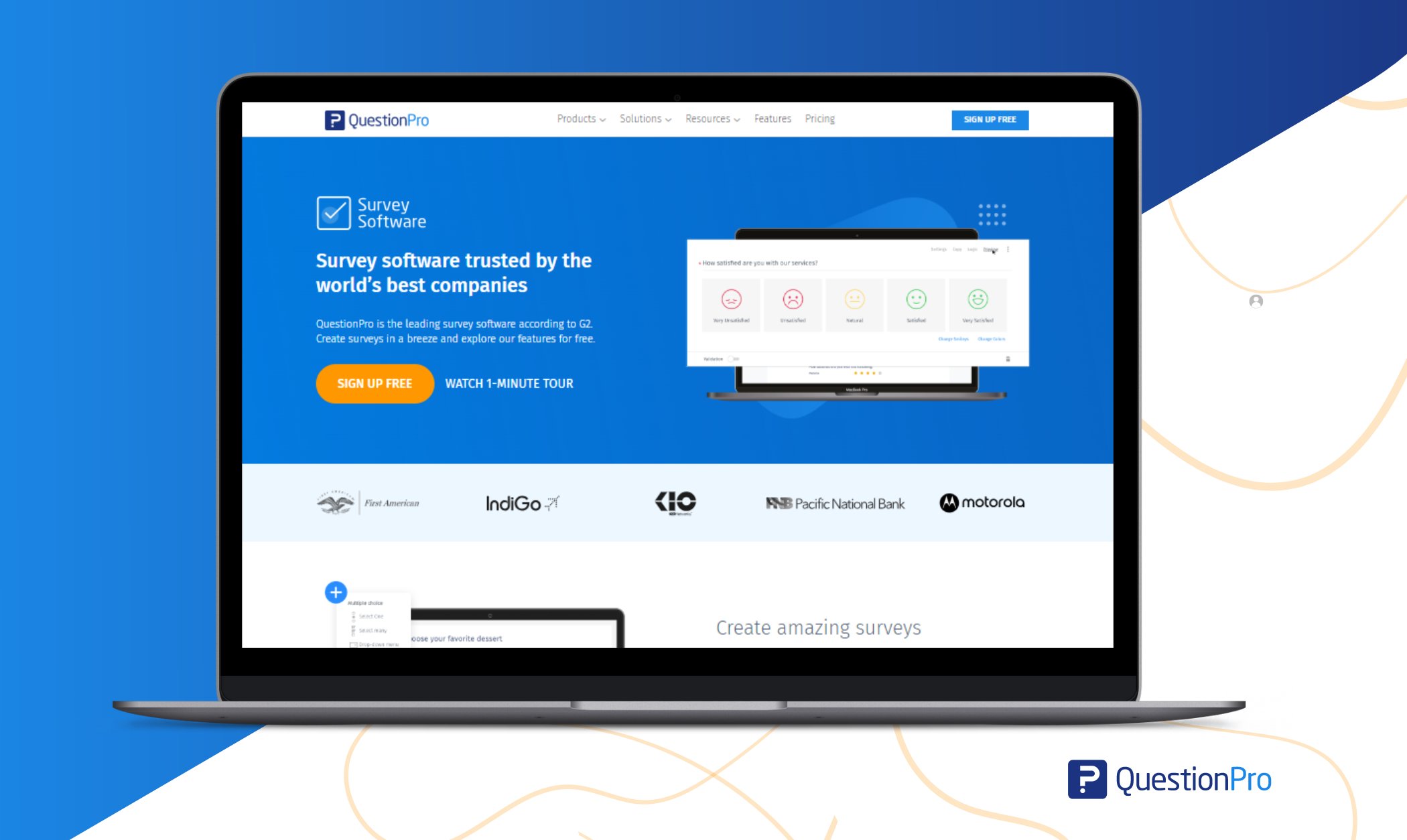
QuestionPro offers robust A/B testing capabilities, allowing businesses to conduct experiments and gather insights to enhance their conversion rates. With its user-friendly interface and comprehensive features, QuestionPro is an excellent choice for businesses looking to optimize their digital assets.
How It Works: QuestionPro enables you to set up A/B tests effortlessly by allowing you to create multiple test variations of your digital assets, such as web pages or emails. You can then track user interactions and analyze the performance of each variation to identify the most effective ones.
Pros:
- User-friendly interface for easy setup and management.
- Advanced targeting capabilities for precise audience segmentation.
- Robust analytics features for real-time insights.
- Integration with third-party platforms.
- Responsive customer support for assistance.
Cons:
- Some users may require additional training to utilize advanced features effectively.
Pricing:
- QuestionPro offers various pricing plans starting from $99 per user per month.
2. Google Optimize
Google Optimize, a product from the tech giant Google, provides a powerful platform for A/B testing and website optimization. Leveraging Google’s vast resources and expertise, Google Optimize enables businesses to test different variations of their website and make data-driven decisions to improve conversions.
How It Works: Google Optimize allows you to create A/B tests and personalization experiments to optimize your website’s user experience. It integrates with Google Analytics, providing valuable insights into user behavior.
Pros:
- The free version has basic features.
- Integration with Google Analytics for deeper insights.
- Robust experiment reporting and analysis tools.
Cons:
- Limited features compared to paid versions.
- Advanced customization may require some technical expertise.
- Limited support options compared to other paid tools.
Pricing:
- Custom enterprise plans are available for larger organizations.
3. VWO
VWO empowers businesses to create, run, and analyze experiments to optimize their websites for better performance. With its intuitive interface and advanced features, VWO is trusted by businesses worldwide to drive conversions and maximize ROI.
How It Works: VWO is a comprehensive A/B testing and conversion optimization platform that allows you to create, run, and analyze experiments across your website or app.
Pros:
- Easy experiment setup.
- Heatmaps & Session Recordings
- Funnel Analysis.
- Collaborative Tools
Cons:
- Pricing plans may be expensive for small businesses.
- Some features may have a learning curve for beginners.
Pricing:
- VWO offers various pricing options, starting from $314 monthly for their Growth pricing plan.
4. Optimizely
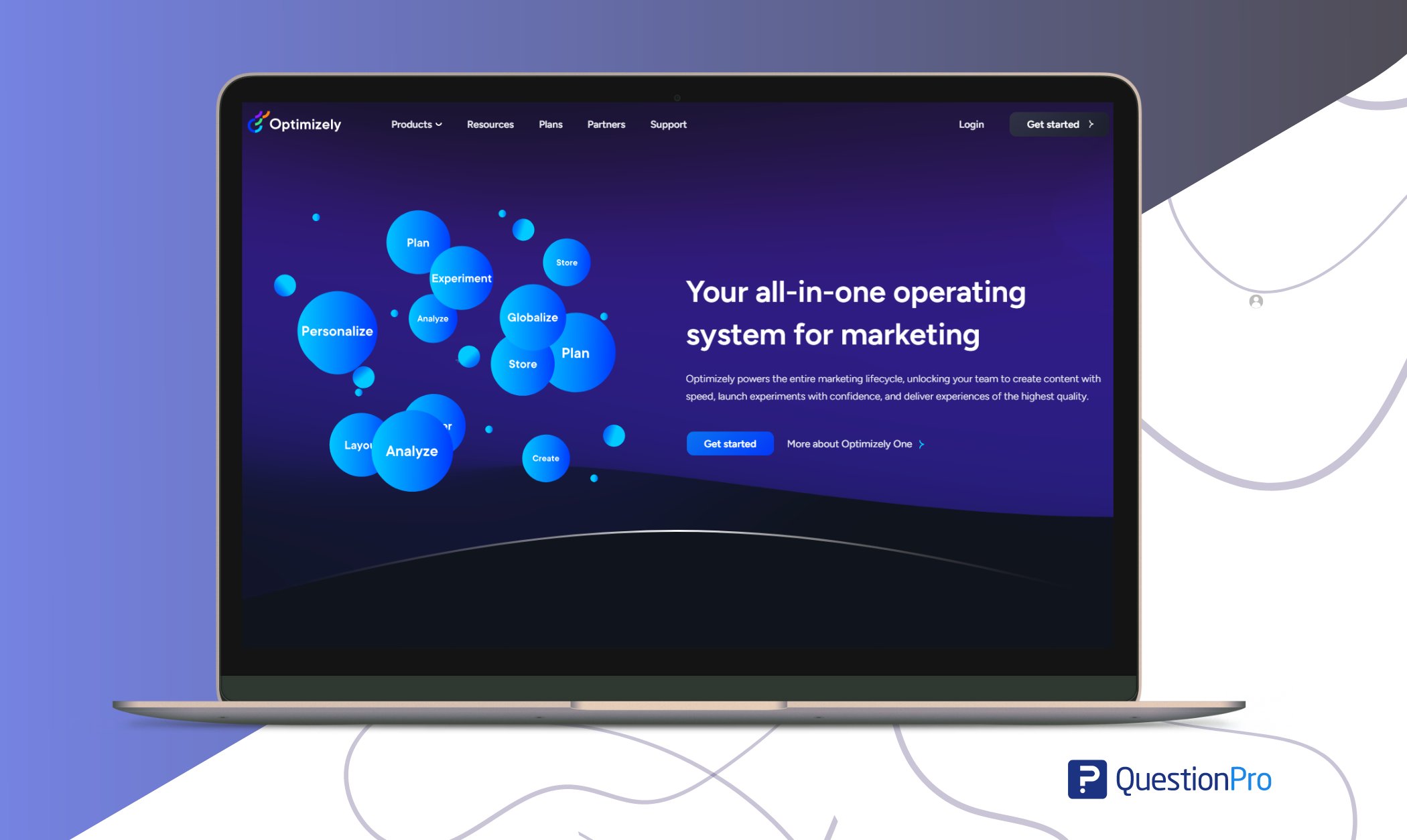
Optimizely is a popular experimentation platform that allows businesses to test hypotheses and optimize their digital experiences. With its powerful suite of tools and analytics capabilities, Optimizely helps businesses make informed decisions to increase conversions and drive growth.
How It Works: Optimizely offers a complete experimentation platform that allows you to create and run A/B tests, multivariate tests, and personalization experiments across your digital properties.
Pros:
- Intuitive visual editor for easy experiment setup.
- Advanced targeting and segmentation capabilities.
- Multi-Armed Bandit Testing
- Feature Flagging
- Full Stack Experimentation
Cons:
- Limited customization options for certain experiment types.
Pricing:
- Optimizely offers custom pricing.
5. AB Tasty
AB Tasty enables businesses to create engaging digital experiences tailored to their audience. With its advanced targeting options and intuitive interface, AB Tasty empowers businesses to optimize conversions and drive revenue.
How It Works: AB Tasty offers an intuitive A/B testing and personalization platform that allows you to create, run, and analyze experiments to optimize your website or app for conversions.
Pros:
- Easy-to-use visual editor for experiment setup.
- Split URL Testing.
- Comprehensive analytics and reporting features.
Cons:
- Occasional bugs or glitches in the platform interface.
Pricing:
- Pricing is available for custom requirements.
6. Kameleoon
Kameleoon is an AI-powered optimization platform that helps businesses deliver personalized experiences to their audience. With its advanced targeting capabilities and real-time data analysis, Kameleoon enables businesses to optimize their digital assets for maximum conversions.
How It Works: Kameleoon offers AI-powered optimization to deliver personalized experiences that drive conversions and improve user engagement. With its intuitive platform and advanced targeting capabilities, Kameleoon helps businesses create tests tailored to their target audience.
Pros:
- AI-powered optimization for personalized experiences.
- Easy-to-use visual editor for experiment setup.
- Continuous updates and feature enhancements.
- Server-Side Testing.
Cons:
- Reporting could be more customizable.
Pricing:
- Pricing is available upon request, with custom plans tailored.
7. Apptimize
Apptimize specializes in mobile app optimization, providing businesses with the tools they need to experiment with different features and functionalities to improve user engagement and drive conversions. With its easy-to-use interface and powerful analytics, Apptimize is a must-have for mobile app developers.
How It Works: Apptimize specializes in mobile app optimization, allowing businesses to test different app features and improve user retention and conversions. With its easy-to-use platform and robust analytics, Apptimize helps businesses create engaging mobile experiences.
Pros:
- Specialized in mobile app optimization.
- Cross-Platform Experimentation.
- Code-Free Visual Editor.
- Server-Side Testing
Cons:
- Pricing may be higher compared to some competitors.
Pricing:
- Pricing is available upon request, with customized plans tailored to your needs.
8. Unbounce
Unbounce is a leading landing page builder with A/B testing functionality. It allows businesses to easily create high-converting landing pages with its drag-and-drop interface and customizable templates. Unbounce also makes it easy for businesses to optimize their landing pages for better conversions.
How It Works: Unbounce is a leading landing page builder with built-in A/B testing functionality. It allows businesses to create high-converting landing pages and test different variations to optimize conversions. With its drag-and-drop builder and robust analytics, Unbounce helps businesses create landing pages that drive results.
Pros:
- Built-in A/B testing functionality for optimizing conversions.
- Continuous updates and feature enhancements.
- Scalable for businesses of all sizes.
Cons:
- Limited customization options for certain landing page elements.
Pricing:
- Pricing is available upon request, with custom plans tailored to fit your needs.
9. Hotjar
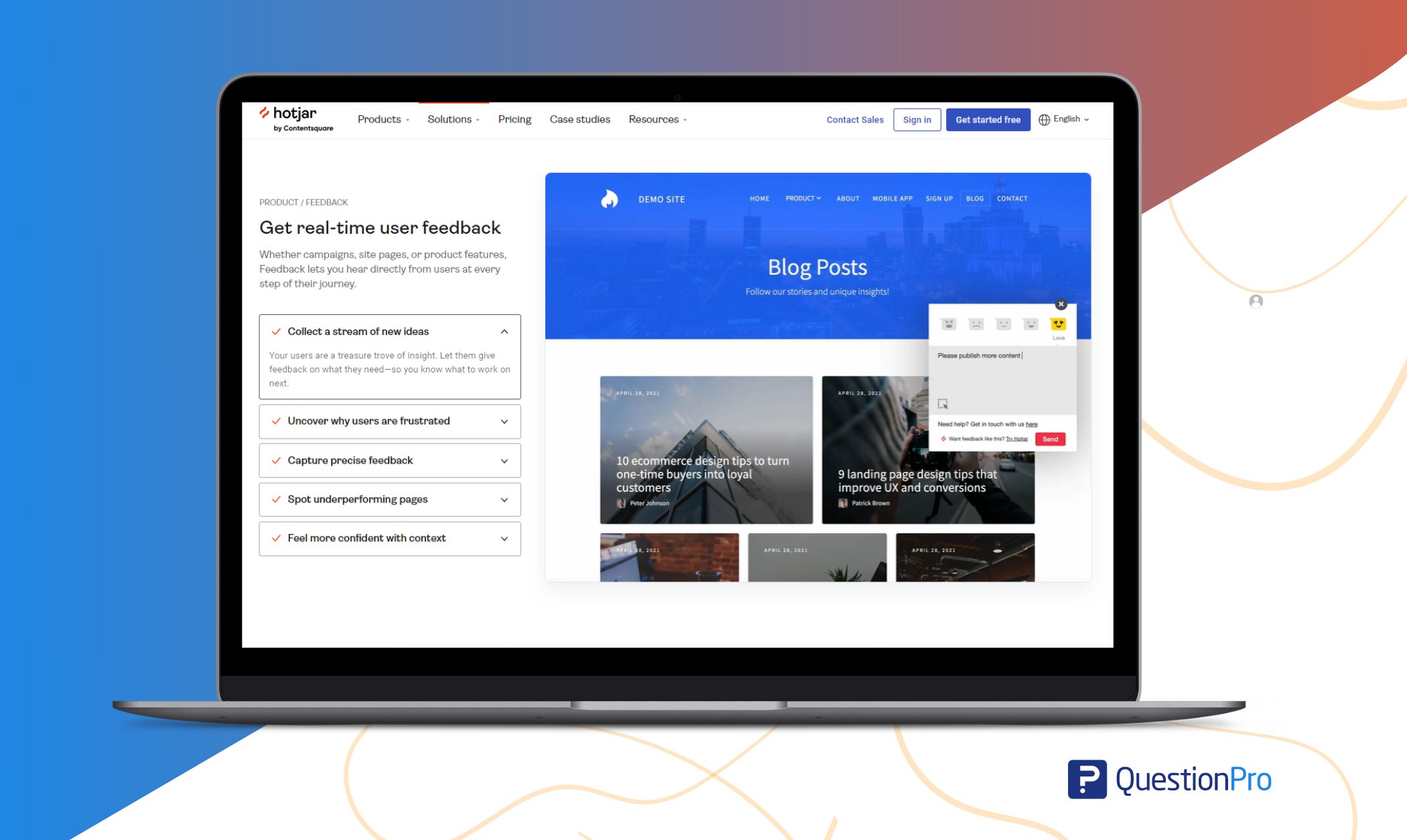
Hotjar offers a suite of tools for website optimization, including A/B testing, heatmaps, and session recordings. With its comprehensive insights into user behavior, Hotjar helps businesses understand how users interact with their websites and make data-driven decisions to improve conversions.
How It Works: Hotjar offers a suite of tools, including A/B testing, heatmaps, and session recordings, to help businesses understand user behavior and optimize their websites for conversions. With its easy-to-use platform and robust analytics, Hotjar helps businesses make data-driven decisions to improve user experience and drive conversions.
Pros:
- Session Recordings.
- Continuous updates and feature enhancements.
- Conversion Funnels.
- Feedback Widgets.
Cons:
- Pricing may be higher compared to some competitors.
- Limited customization options for certain test elements.
Pricing:
- Pricing plans start from $80 monthly for the Business plan, with custom plans available for larger organizations.
10. Crazy Egg
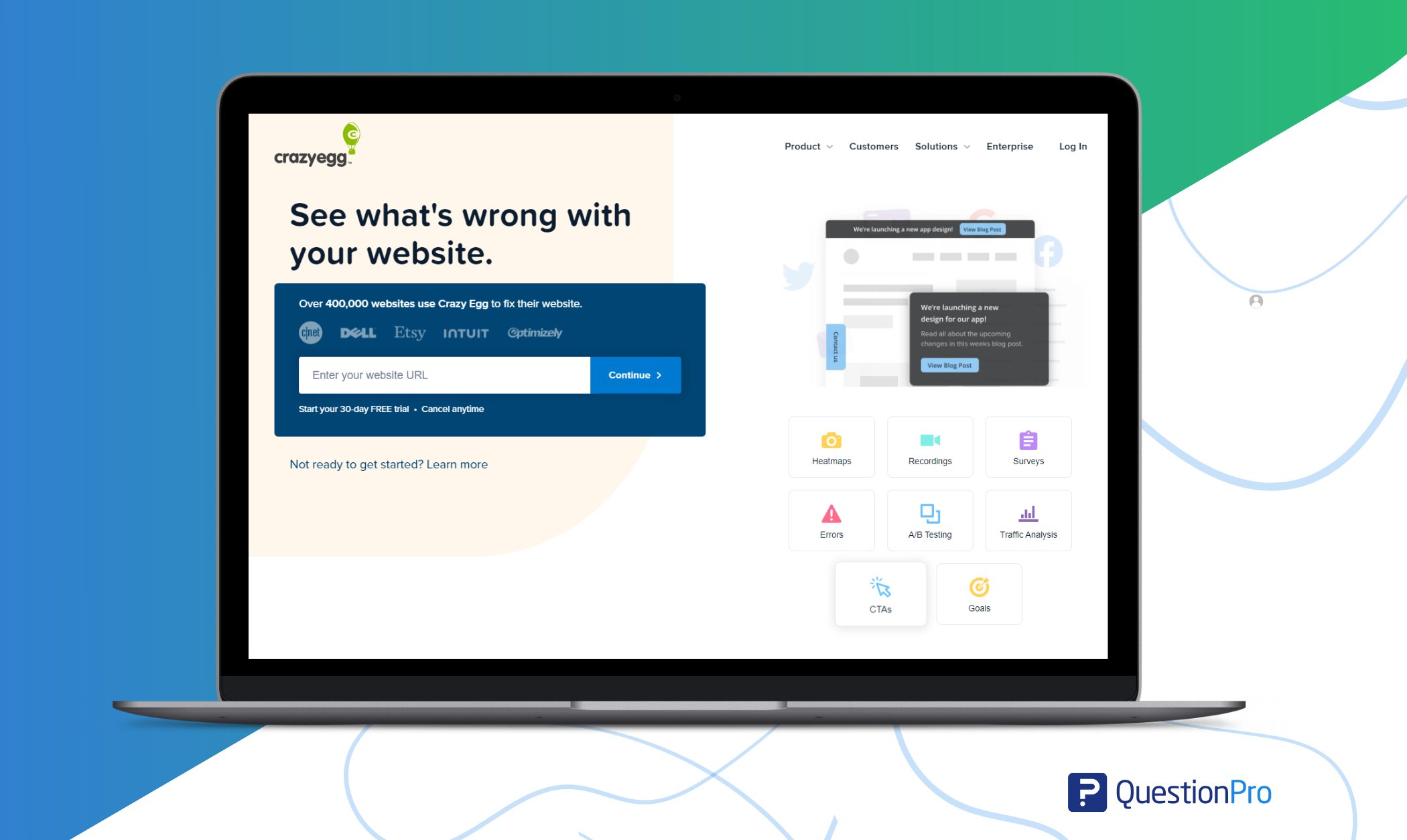
Crazy Egg provides visualizations like heatmaps and scrollmaps to help businesses understand user interactions on their website. Combined with its A/B testing capabilities, Crazy Egg enables businesses to optimize their digital assets for better conversions and user experiences.
How It Works: Crazy Egg offers heatmaps, scrollmaps, and A/B testing tools to help businesses understand user behavior and optimize their websites for conversions. With its intuitive platform and visual insights, Crazy Egg helps businesses identify areas for improvement and increase conversions.
Pros:
- Heatmaps and scrollmaps for visualizing user behavior.
- A/B testing functionality for optimizing conversions.
- Feature experimentation capabilities
Cons:
- Pricing may be higher compared to some competitors.
Pricing:
- Contact Crazy Egg for their pricing.
11. Adobe Target
Adobe Target is a powerful optimization and personalization platform that allows businesses to deliver targeted experiences to their audience. With its advanced targeting options and robust analytics, Adobe Target helps businesses increase conversions and drive revenue.
How It Works: Adobe Target is part of Adobe’s Experience Cloud and offers advanced personalization and A/B testing capabilities. With its robust platform and integrations with other Adobe products, Adobe Target helps businesses deliver personalized experiences and increase conversions.
Pros:
- Advanced personalization and A/B testing capabilities.
- Customizable pricing plans to fit different budgets.
- Comprehensive documentation and training materials.
Cons:
- Learning curve for beginners.
Pricing:
- Pricing is available upon request, with customized plans tailored to your needs.
12. SiteSpect
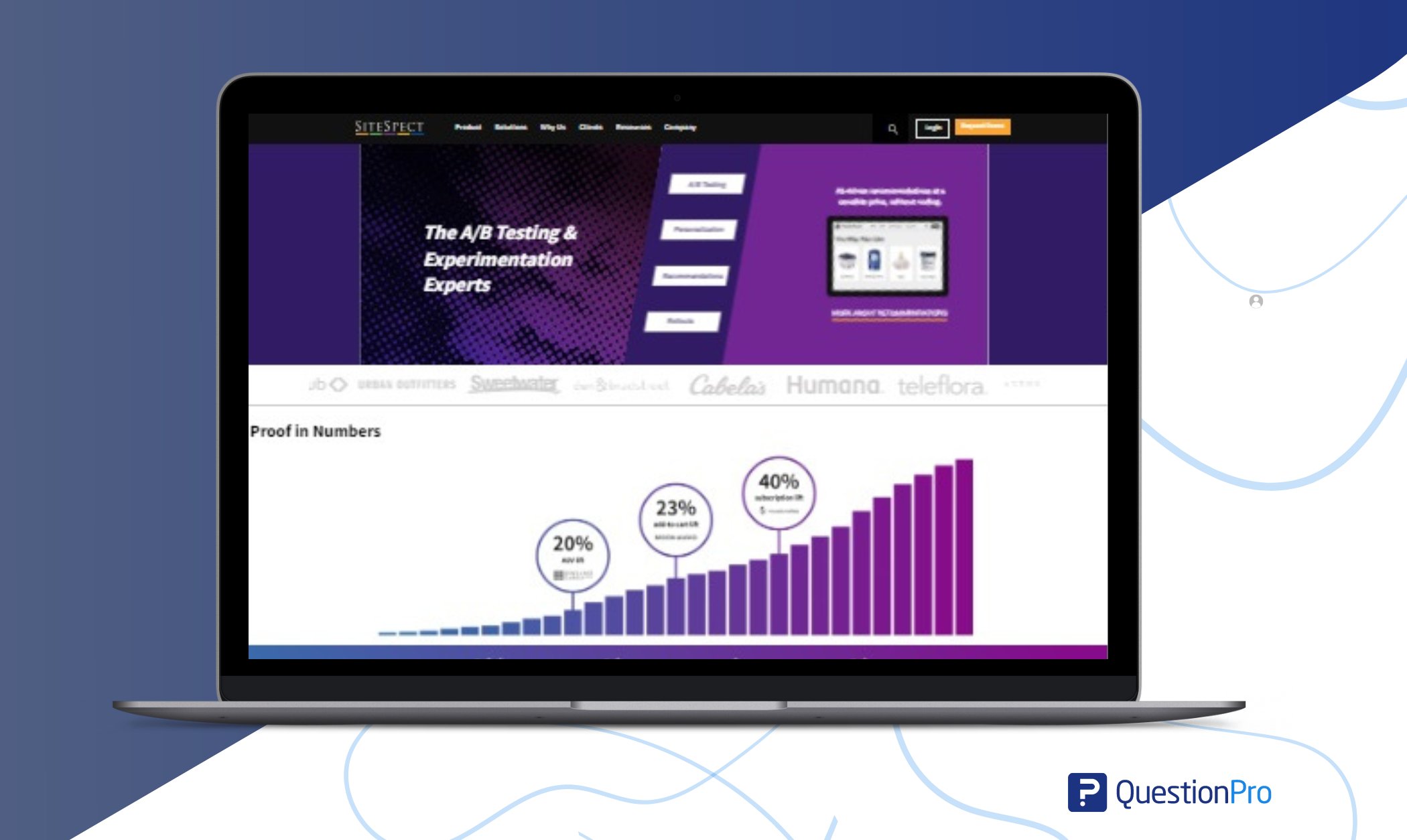
SiteSpect offers a scalable optimization platform with advanced A/B testing and targeting capabilities. With its flexible architecture and powerful analytics, SiteSpect enables businesses to optimize their digital assets for maximum conversions and ROI.
How It Works: SiteSpect offers a comprehensive optimization platform with A/B testing, multivariate testing, and personalization capabilities. With its powerful platform and advanced targeting options, SiteSpect helps businesses optimize their websites and increase conversions.
Pros:
- Comprehensive optimization platform.
- Advanced A/B testing and multivariate testing capabilities.
- Real-time analytics and reporting features.
Cons:
- Reporting could be more customizable.
- Integration with certain third-party platforms may require technical assistance.
Pricing:
- Pricing is available upon request, with customized plans tailored to your needs.
13. Oracle Maxymiser
Oracle Maxymiser is a comprehensive testing and personalization platform that helps businesses deliver tailored experiences to their audience. With its advanced targeting options and predictive analytics, Oracle Maxymiser empowers businesses to optimize their digital assets for better conversions and customer experiences.
How It Works: Oracle Maxymiser is part of Oracle’s Marketing Cloud and offers advanced testing and personalization capabilities. With its powerful platform and integrations with other Oracle products, Oracle Maxymiser helps businesses deliver personalized experiences and increase conversions.
Pros:
- Advanced testing and personalization capabilities.
- Seamless integration with other Oracle products.
- Enterprise-grade security and compliance.
Cons:
- Limited customization options for certain test elements.
Pricing:
- Pricing is available upon request, with customized plans tailored to your needs.
14. Convert
Convert helps businesses improve user experience and drive conversions. It offers a range of tools for website and app optimization, along with advanced targeting features for customized testing.
How It Works: Convert provides A/B testing, split URL testing, and multivariate testing, allowing businesses to run complex experiments across various digital assets. It integrates with a wide range of third-party platforms, making it easier to track and analyze user interactions.
Pros:
- User-friendly interface with a minimal learning curve.
- Advanced segmentation and targeting options.
- Privacy-focused platform is compliant with GDPR.
Cons:
- Pricing may be higher for larger teams.
- Limited customer support for lower-tier plans.
Pricing:
- Custom options are available for enterprises.
15. Instapage
Instapage is a landing page builder with built-in A/B testing functionality, making it ideal for businesses looking to optimize their landing pages for conversions. It offers a wide range of templates and an intuitive drag-and-drop editor for easy customization.
How It Works: Instapage allows users to create high-converting landing pages and run A/B tests to determine which variations perform better. It also offers detailed analytics and heatmaps for better insights into user behavior.
Pros:
- Intuitive drag-and-drop editor.
- Built-in heatmaps and analytics for user behavior tracking.
- Wide range of customizable templates.
Cons:
- Limited A/B testing features compared to dedicated tools.
- Higher pricing tiers for advanced features.
Pricing:
- Custom plans are available for enterprises.
Why Choose QuestionPro as Your Right A/B Testing Software?
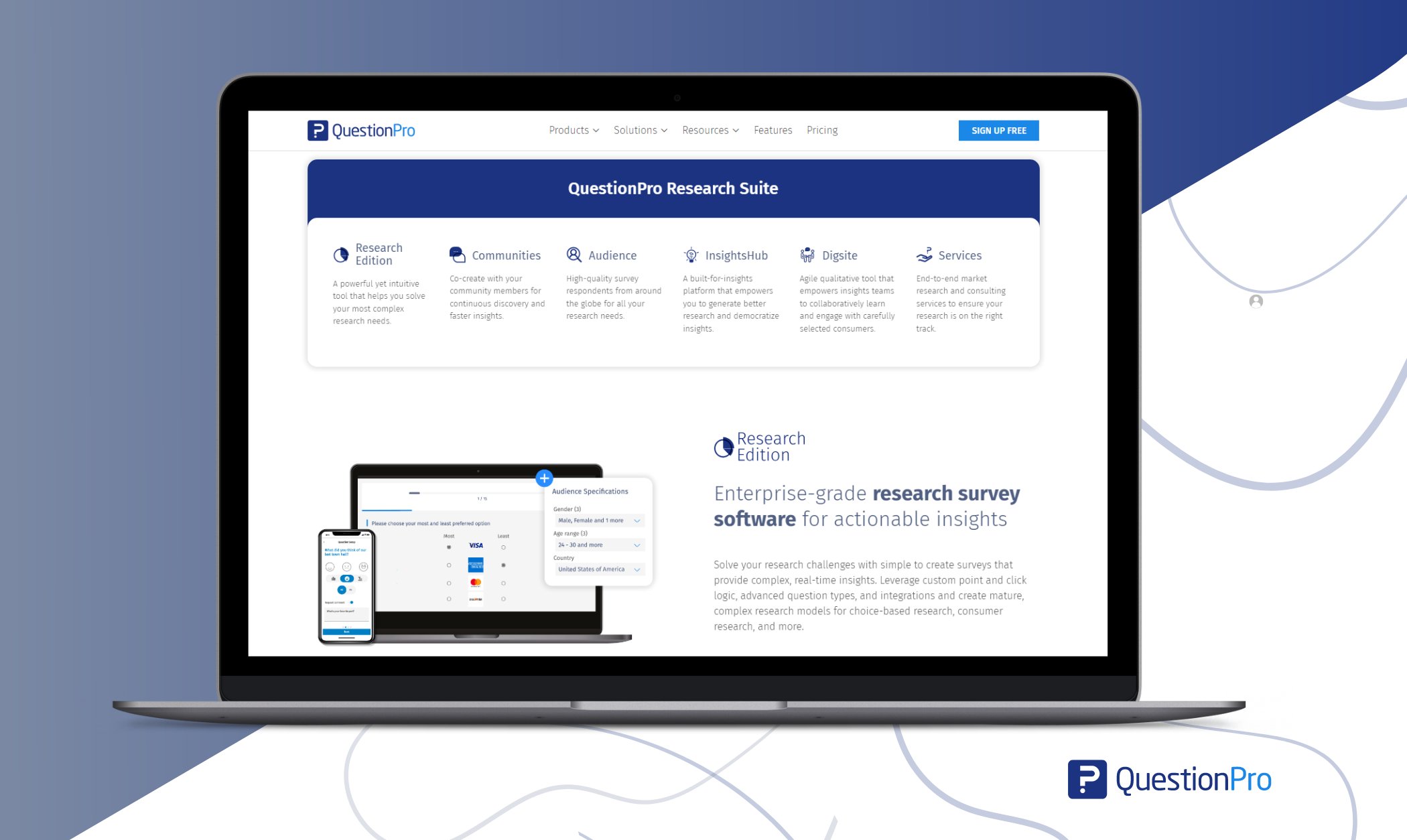
With the right A/B testing software like QuestionPro, businesses can unlock invaluable insights to enhance their surveys and drive better results. Explore how QuestionPro can help your business as the ideal A/B testing software.
QuestionPro Boost Your Experimentation
A/B testing involves comparing two versions of a webpage or app to determine which one performs better. QuestionPro provides a strong platform for setting up and running experiments effortlessly.
Its user-friendly interface and intuitive tools streamline the entire process, allowing you to focus on optimizing your digital assets without getting complicated by technical complexities.
Helps You in Data-Driven Decision Making
QuestionPro’s robust analytics capabilities give you valuable insights into user behavior and preferences. Real-time data tracking enables you to monitor the performance of different variations and identify patterns that can inform future iterations. By leveraging these insights, you can make data-driven decisions that drive tangible results for your business.
Allow You Versatile Testing Options
Whether you’re testing website layouts, email campaigns, or mobile app features, QuestionPro offers a wide range of testing options to suit your needs.
From simple changes like button colors to more complex variations in content and design, you can experiment with different elements and find the optimal combination that resonates with your target audience.
QuestionPro Offers Audience Segmentation
One size does not fit all when it comes to digital experiences. QuestionPro allows you to segment your audience based on various criteria, such as demographics, location, or browsing behavior. By creating experiments to specific audience segments, you can deliver personalized experiences that cater to their unique preferences and increase engagement and conversions.
QuestionPro Offers Integration With Existing Tools
Integration enables you to explore existing data and insights to fully inform your A/B testing strategies. Connecting QuestionPro with your existing tech stack allows you to maximize efficiency and streamline your optimization efforts.
QuestionPro Ensures Cost-Effective Solutions
Cost is always a consideration for businesses, especially when it comes to investing in new tools and technologies. QuestionPro offers flexible pricing plans to accommodate businesses of all sizes and budgets.
Whether you’re a startup looking to experiment on a short budget or a large enterprise scaling your testing efforts, QuestionPro provides cost-effective solutions without compromising quality or functionality.
Conclusion
A/B testing software is vital in optimizing websites and apps for conversions. Each of the 15 A/B testing tools mentioned in this guide offers unique features, advantages, and pricing options. By carefully evaluating your business needs and budget, you can choose the right tool to drive more conversions and achieve your business goals.
QuestionPro offers a comprehensive suite of features and capabilities, making it the ideal A/B testing tool for businesses looking to optimize their digital experiences. It is the perfect partner to help you stay ahead of the competition and achieve your business objectives in today’s dynamic digital landscape.
So, get ready to unleash your website’s full power and watch your conversions get higher with QuestionPro!
Frequently Asked Questions (FAQ)
A/B testing software helps you scientifically test changes to your webpage or app and determine which versions drive more conversions. This data-driven approach can lead to higher conversion rates, better user experiences, and, ultimately, increased revenue.
A/B testing software works by splitting your traffic into different groups and showing each group a different version of your webpage or app. It tracks user interactions, collects data on performance metrics (like conversion rates), and analyzes the results to determine which version is more effective.
The primary metrics to track depend on your goals but often include conversion rates, click-through rates, bounce rates, time on site, and revenue per visitor. Secondary metrics might include user engagement and retention rates.





